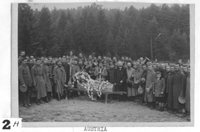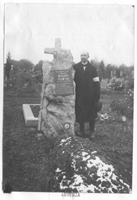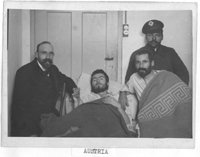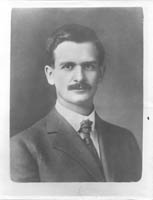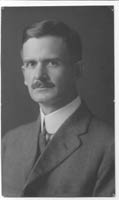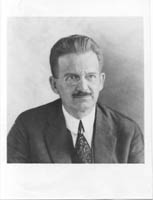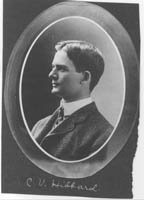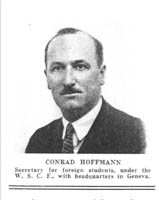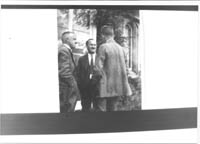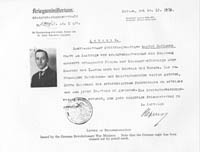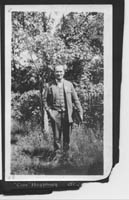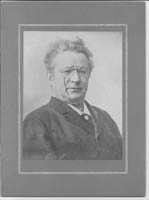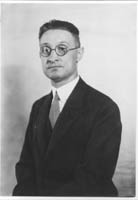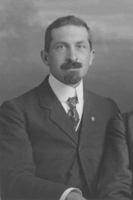Table of Contents
Key Figures
YMCA Secretaries
a | b | c | d | e | f | g | h | j | k | l | m | n-o | p | r | s | t-u | v | w | y-z
Fred P. Haggard
Archibald C. Harte appointed Haggard as the Senior American Secretary for War Prisoners Aid (WPA) operations in Russia in May 1916. Haggard was responsible for supervising Association welfare services for Central Power prisoners of war across the tsarist empire. He left Russia in December 1916 to return to the United States.
Carl Hahn
A Swiss YMCA Secretary, Hahn volunteered to serve as a War Prisoners' Aid Secretary in Austria-Hungary with the World's Alliance. He was appointed to begin operations in September 1918, just before the Austro-Hungarian collapse in the Balkans and Italy. As a result of the armistice of November 1918, the Dual Monarchy repatriated the Allied prisoners held in Austria and Hungary.
Thomas C. Hall
An ardent advocate of the YMCA, Hall was an exchange professor in Germany when World War I erupted. He became integrated into the War Prisoners' Aid program when Archibald Harte proposed the program to the German Ministry of War. Hall became a member of the German YMCA WPA Committee (Deutsches Kommitee der Kriegsgefangenenhilfe der Christlicher Vereine jünger Männer) when the organization was formed in Berlin in April 1916 and served as the chairman of the Special Executive Committee, which supervised daily WPA operations. Hall visited a number of prison camps in Germany and attended the inaugurations of new Association halls. In January 1917, Hall joined Conrad Hoffman and Prince Maximilian of Baden to negotiate an agreement with the Ministry of War to maintain WPA services when relations between Germany and the United States deteriorated over the German decision to resume unrestricted submarine warfare. These talks persuaded General Friedrich, commander of the POW system in Germany, to allow Hoffman to stay in Germany to continue WPA operations as neutral secretaries arrived to replace the departing American welfare workers. After most of the U.S. secretaries left the empire in February 1917, Hall ran the WPA Office in Berlin during the transition period. He left Germany in March, before the United States declared war on Germany, and went to Switzerland. Hall then continued WPA services with the World's Alliance in Geneva. When the Harte controversy arose during Mott's visit to Geneva in April 1918, Hall supported the American YMCA policies.
P. M. Hamilton
When the American YMCA issued a call for volunteers to assist in post-war War Prisoners Aid (WPA) operations for Russian and Central Power prisoners of war during the repatriation process in the Baltic region during the Summer of 1920, Hamilton was one of fifteen American Rhodes Scholars at Oxford University who responded. Hamilton provided relief service to refugees and former POW's on transport ships plying between Stettin, Germany and Narva, Estonia, Riga, Latvia, and Björkö, Finland.
Marius Hansen
A Danish YMCA secretary, Hansen volunteered to work in Germany serving Allied prisoners of war as a World's Alliance WPA Secretary. He arrived in Germany in November 1917 and worked primarily in East Prussia, although he also visited prison camps in Rhenish Prussia in the west. His area of operations was the XVII Army Corps, based in Danzig, and the XX Army Corps, headquartered in Allenstein. He also did some work in the XXI Army Corps in Saarbrücken. Hansen was one of the neutral workers who replaced the American WPA Secretaries who left Germany in February 1917.
V. C. Hart
This American YMCA secretary volunteered to conduct War Prisoners Aid (WPA) relief work for Russian prisoners of war in Germany after the Armistice. In November 1920, Hart operated welfare programs in seven prison camps in Hannover and Westphalia. He maintained this service until November 1921, when the Association ended this work after the departure of most of the Russian prisoners.
Archibald Clinton Harte (1865-1946)
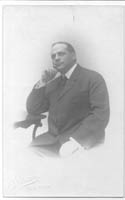
See also:
Chap. 04, p1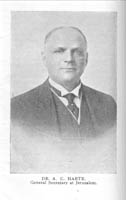
See also:
Chap. 05, p7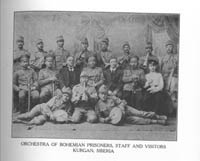
See also:
Chap. 05, p18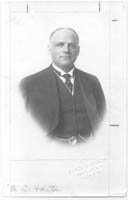
See also:
Chap. 06, p12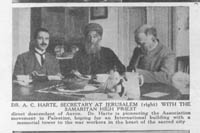
See also:
Chap. 16, p25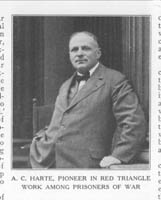
See also:
Chap. 19, p24Reverend Harte became the General Secretary in Europe for the International Committee in New York during the First World War, serving as the chief architect for the development of the War Prisoners' Aid (WPA) program. From 1888 to 1906, Harte worked as the General Secretary of the Mobile YMCA. As the Chaplain for the Second Alabama U.S. Volunteers, he served in Cuba during the Spanish-American War. John R. Mott asked Harte to work for the International Committee in Colombo, Ceylon in 1906 on a temporary basis. Two years later, Harte became the General Secretary of the Indian National Council of YMCA's. Mott offered Harte a new mission in early 1915; he asked Harte and Carlisle V. Hibbard to travel to Europe and negotiate Association access to prisoners of war among the belligerent powers. Harte succeeded in gaining access to Allied prisoners in Germany, if similar relief services could be offered to German POW's in Russia. Traveling across the breadth of the Russian Empire twice to inspect prison camps, Harte persuaded the tsarist government to accept American secretaries to conduct POW relief work. Harte negotiated similar agreements with the Austro-Hungarian and Romanian governments, establishing WPA programs in those countries as well. Harte became the International General Secretary in Europe for the International Committee and supervised WPA relief operations for the American YMCA until 1919. With the support of Mott and Sir Arthur Yapp, the General Secretary of the English National YMCA Council, Harte went to Jerusalem to establish an Association in the Holy Land after the war. Harte worked in Jerusalem until 1929, when he traveled to Damascus to set up a YMCA in Syria. He retired to Palestine in 1931.
C. C Hatfield
This American YMCA Secretary served as a War Prisoners Aid Secretary in post-war Germany, working with Russian prisoners of war. He established the YMCA Vocational School for Russian refugees at Wünsdorf. Hatfield also began POW relief operations in prison camps in Mecklenberg, Pomerania, and Bavaria until the Association shut down WPA services in November 1921 with the departure of most Russian prisoners.
Edward T. Heald (1886-1967)
Heald was an American YMCA Field Secretary in Russia during World War I. In September 1916, the International Committee in New York dispatched Heald to Russia to serve as a War Prisoners' Aid Secretary for Central Power POW's. After the February Revolution in March 1917, Heald began to work with Russian soldiers, setting up Associations in Petrograd and Minsk. He became the Senior Office Secretary in Petrograd in July 1917 and supported WPA administration in Russia. With the outbreak of the Russian Civil War, Heald took over American YMCA war work operations in Siberia, working out of Omsk and aiding the Czech Legion in its transportation to Vladivostok. In 1919, Heald returned to the United States and became the General Secretary of the Troy, New York YMCA. He became the Canton, New York YMCA General Secretary in 1929 and retired from Y service in 1945. He then became a historian with the Stark County Historical Society and wrote a number of books.
Julius F. Hecker
Born in St. Petersburg, Russia of German-French ancestry, Dr. Hecker immigrated to the United States, where he received a Ph.D. from Columbia University. He directed the Methodist Church Mission for Russians in New York City until the outbreak of World War I. Hecker volunteered for Red Triangle service and the International Committee sent him to Austria-Hungary to serve as an assistant to Edgar MacNaughton. Hecker arrived in the Dual Monarchy in March 1916 and established War Prisoners Aid (WPA) operations in Lower Austria, at Wieselburg and Purgstall, and in Upper Austria, at Hart. At Wieselburg, Hecker arranged with Austrian authorities to donate buildings for a church, an Association hall, and a cinema. He also collected books for two libraries and, due to the scarcity of Russian books, Hecker arranged for prisoners to print their own copies of Russian texts. Hecker also took a deep interest in boys' work and persuaded Austrian officials to send young Russian prisoners to the school he established at Wieselburg. In addition, Hecker worked with a Russian doctor to set up a vocational school at Wieselburg for soldiers who lost limbs so they could learn new occupations and not become a burden on society after the war. For boy prisoners at Hart, Hecker organized a school program. In February 1917, Hecker established a similar program for young prisoners at Nezsider in Hungary. When relations between the United States and Austria-Hungary became strained in April 1917, Hecker volunteered to remain in Austria as an enemy alien to maintain WPA work. Instead, the Association sent Hecker to Geneva where he began work with the World's Alliance. He became responsible for collecting and sending books to German prison camps and printing Russian books for camp circulation. Hecker also published twenty books in Russian including an alphabet book for illiterates; textbooks of popular science, mathematics, geography, physics, botany, and agriculture; and translated recreational extracts by Russian authors. When John R. Mott visited Geneva in April 1918 to address the WPA leadership controversy between the World's Committee and Archibald Harte, Hecker attended the session in support of the American Association.
Hermann Helbing
The German National YMCA Secretary, Helbing first gained prominence in the Association at the Fourteenth World's Conference of YMCA's in Basle in July 1898 when he presented a paper on Soldiers' Work and the importance of missionary work in the German Army. The German National YMCA appointed Helbing as the organization's first National Traveling Secretary in October 1900. He presented another paper at the Fifteenth World's Conference in Christiana, Norway in August 1902, which discussed the difficulties within the German Association Movement. The German National YMCA consisted of nine separate regional organizations and their lack of coordination made it difficult for the Germans to have any influence on international work. At the Geneva Plenary Meeting in August 1903, a controversy emerged between the German and British Associations over the Paris Basis. For two years tensions mounted until Helbing traveled to London in April 1905 and met with W. H. Mills. They healed a potential schism between the German and British YMCA's over spiritual doctrine. Helbing, on the other hand, strongly advocated the independence of the World's Alliance and opposed the growing dominance of the American and English Associations. He argued that the stronger movements should provide funding while the World's Committee assumes responsibility for the implementation of the world mission. Helbing also played an important role in assisting the Austro-Hungarian YMCA obtains funding for the construction of a building in Vienna before the beginning of the war. At the Eighteenth World's Conference at Edinburgh in June 1913, the delegates approved the establishment of a ten-member Executive Committee. Helbing served as an advisory member of this committee which directed World's Alliance operations during World War I.
Rexford Hersey
One of fifteen American Rhodes Scholars at Oxford University who volunteered to serve Russian and Central Power prisoners of war in the Baltic region with the YMCA, Hersey worked in Germany and the Baltic states during the Summer of 1920. Hersey supported War Prisoners Aid (WPA) operations in Stettin, Germany and in Narva, Estonia, Riga, Latvia, and Björkö, Finland by providing relief operations on transport ships for former POW's and refugees.
J. J. Hertig
This Danish War Prisoners Aid Secretary began supporting POW relief operations in Austria-Hungary in August 1917 as one of the neutral YMCA replacements for the departed American WPA Secretaries. He conducted most of his work in Niederösterreich (Lower Austria), starting his relief operations at Spratzern. In December 1917, Hertig expanded services to Siegmundsherberg and to Neulengbach three months later. In March 1918, the WPA secretary took over relief work in Braunau-am-Inn in Oberösterreich (Upper Austria).
Carlisle V. Hibbard (1876-1954)
Hibbard served as the Associate General Secretary of the International Committee in New York during World War I. He began Association service in 1900 when he became the General Secretary at Northwestern University. In 1902, he accepted a call to serve as a Student Secretary in the Tokyo Association. From 1904 to 1905, he conducted war work relief operations for Japanese soldiers in Manchuria during the Russo-Japanese War. He returned to the Tokyo YMCA and remained until 1907, when Hibbard became the Associate National Secretary for Japan. He returned to the United States in 1914. John R. Mott approached Hibbard in 1915 and asked him to travel to Europe with Archibald C. Harte and negotiate with the belligerent governments to gain Association access to prisoner of war camps. Hibbard conducted negotiations in England and France and helped found the War Prisoners' Aid program. Mott recalled Hibbard back to New York to serve as the Associate General Secretary for the International Committee and the National War Work Council. He was in charge of the Committee on Allied Armies and Prisoners of War and supervised all of the overseas work. In 1924, Hibbard left New York and became the General Secretary of the University of Wisconsin YMCA until 1940. He returned to work at Wisconsin from 1944 to 1949 in charge of special services.
Lars E. Högberg
This Swedish YMCA secretary volunteered to serve as a World's Alliance War Prisoners Aid Secretary in Austria-Hungary during World War I. He arrived at Milowitz in Bohemia in June 1917 and expanded operations to Brüx the next month. Högberg was one of the replacement workers for the American WPA Secretaries who left the Dual Monarchy before Washington severed diplomatic relations with Vienna.
Conrad Hoffman (d. 1958)
Hoffman was a YMCA Field Secretary in Germany during the First World War, serving as the Senior War Prisoners Aid Secretary. From 1913 to 1915, Hoffman was the General Secretary of the University of Kansas YMCA. In 1915, he was a member of the first Flying Squadron of American YMCA Secretaries sent to Europe to set up WPA operations. He was assigned to work in Germany and became the Senior Secretary of the War Prisoners' Aid program for Allied POW's. When the United States broke off diplomatic relations with Germany in February 1917, Hoffman chose to remain and maintained POW relief work until 1919, with the approval and support of the German Ministry of War. He joined the European Student Relief program of the World's Student Christian Federation in 1920 and transferred to the Foreign Student Service of the WSCF in 1927. Three years later, Hoffman became the Director of the Committee on Christian Approach to Jews, an organization within the International Missionary Council. He worked for this committee until his retirement in 1953. During World War II, Hoffman shared his considerable wartime experience by working for the War Prisoners' Aid program of the World's Committee in Geneva.
Adolf Hoffmann
A German pastor who resided in Switzerland, Reverend Hoffmann was a long-time leader in the World's Alliance of YMCA's. At the First Central International Committee Plenary Meeting in Geneva, in August 1886, Hoffmann became a member of the Executive Committee. This group was the forerunner of the World's Committee and was tasked with designing a system of governance of the World's Alliance. The delegates at the Twelfth World's Conference of YMCA's at Amsterdam adopted the proposed organization in August 1891. A number of problems were brewing in the Association Movement at this time. Hoffmann traveled to Eisenach in August 1892 to attend the National German YMCA Conference where he had to explain the work and mission of the World's Committee to the German delegates. There was also some controversy over plans for the YMCA Jubilee meeting scheduled in 1894; the Germans pointed out that nine German Associations existed before 1844. The tensions within the Association Movement heightened by the time of the Christiana Plenary Meeting in August 1902, which threatened to result in a schism between the American and English Associations and the World's Alliance. The question of the mission of the Association arose over whether the YMCA was a lay movement (a view strongly supported by the American and British YMCA's) or if it was an interdenominational movement (held by many European Associations). The Germans argued that the YMCA should be independent, but should work hand-in-hand with the church. Hoffmann recommended a revision of the Association's constitution to prevent an open breach. This controversy ran for two-and-a-half years before it was finally settled in April 1905. The national delegates agreed that the Paris Basis should remain the foundation of the YMCA, that policies would be devised and implemented at the national level, and that the World's Committee was to serve all of the Associations around the world and not adopt a particular perspective. In June 1913, delegates at the World's Conference at Edinburgh established an Executive Committee, which included Hoffmann as a member. This committee would direct the World's Alliance's operations during World War I. One of its most important meetings occurred in April 1918, when John R. Mott visited Geneva. Tensions had emerged between the World's Alliance and the American YMCA regarding the POW diplomacy Archibald Harte conducted in terms of supervising the War Prisoners' Aid program and Mott's decision to participate in the Root Mission to Russia. The German Ministry of War became concerned about continued American YMCA funding for WPA operations and condemned Mott's actions. The ministry threatened to shut down WPA operations in German prison camps. The Executive Committee decided to send Christian Phildius and Hoffmann to Berlin in June 1918 to conduct negotiations with the Minister of War. With the active support of Prince Maximilian of Baden, General Friedrich agreed to countermand the order to shut down WPA operations and agreed to permit Conrad Hoffman to continue to supervise POW relief operations in Germany.
Halfdan Høgsbro
This Danish YMCA secretary volunteered for World's Alliance War Prisoners Aid (WPA) service and arrived in Germany in November 1917. He served POW's in Saxony and Silesia, conducting operations in the I Royal Saxon/XII Army Corps (Dresden), the II Royal Saxon/XIX Army Corps (Leipzig), the V Army Corps (Posen), and the VI Army Corps (Breslau). Høgsbro was one of the neutral workers who replaced American WPA Secretaries who left Germany in February 1917.
Ralph W. Hollinger (1887-1930)
Hollinger served as a War Work Secretary in Russia during the First World War. He was the General Secretary for the Adelbert College Association, in Cleveland, in 1909 and transferred to the Cleveland YMCA in 1912. In 1914, Hollinger accepted an assignment to serve in Russia with the Miyak (Lighthouse), the Russian YMCA, in St. Petersburg. From 1915 to 1918, he served as the Associate General Secretary in the Petrograd Association. Hollinger undertook war work with Russian soldiers in Central Russia in 1918 and from 1919-1921 served as the General Secretary for the Army and Navy YMCA at the Russian Headquarters in Siberia. Hollinger transferred to Berlin in 1921 to work on the Headquarters Staff in the Russian Department for two years. In 1923, he became the Associate Administrative Secretary in Geneva in which he trained YMCA staff members for work in Estonia, Latvia, Poland, Czechoslovakia, Bulgaria, Romania, Italy, Portugal, Greece, and Turkey. Hollinger returned to the United States in 1928 to join the Student Division of the National Council of YMCA's of the USA and became the Director of the Lake Geneva Student Conference.
Rudolf Horner (1865-1927)
A World's Alliance Secretary, Horner began work as a Swiss YMCA secretary who received his training at Springfield College in Massachusetts. In 1902, the World's Alliance sent Horner to serve as the Agent and Secretary for Portugal at Oporto, with the support of the German-Swiss Associations. Horner eventually became the General Secretary for Portugal, based in Lisbon. In 1913, the German National YMCA Committee called on the World's Alliance to send Horner to South America to investigate the opportunities for establishing Association work for German immigrants. This call was approved at the London Plenary Meeting in August 1914, but the onset of World War I cancelled the plan. In July 1916, the World's Alliance recalled Horner to Geneva and appointed him a member of the World's Committee. He accepted the task of setting up the War Prisoners' Aid headquarters in Geneva and the assignment of addressing the moral and intellectual needs of prisoners of war interned in Switzerland. Horner worked with J. Gustav White and Julius Hecker to collect books and send the reading material to POW camps in Germany during the war. He also developed relief services for British and German prisoners interned in Switzerland and extended relief operations to wounded and exchanged prisoners of war passing through the Swiss Federation for home. Horner participated in the April 1918 Executive Meeting in Geneva when John R. Mott visited the World's Committee to explain his actions on the Root Mission and Archibald Harte's POW diplomacy in response to the German YMCA's threat to withdraw from the World's Alliance. After the war, Horner served the World's Committee until 1925 as the secretary in charge of migration and the extension of YMCA service to Latin American countries.
Olaf Høyer
This Danish YMCA secretary volunteered to work in Germany in 1918 as a World's Alliance War Prisoners Aid Secretary. He worked primarily in Pomerania, in the II Army Corps (based in Stettin), and Schleswig-Holstein, in the IX Army Corps (with headquarters in Altona). Høyer was one of the neutral workers who replaced the departed American WPA Secretaries.
Edouard Hug
This Swiss YMCA secretary volunteered to work with Allied prisoners of war in Austria-Hungary as a World's Alliance War Prisoners Aid Secretary after the American WPA Secretaries left the Dual Monarchy in April 1917. Hug was conducting POW relief operations in Upper Austria by July 1918, working in the prison camps at Aschbach, Braunau-am-Inn, and Marchtrenk as well as the facility at Grödig in Salzburg. In November 1918, Hug had expanded operations to Deutsch-Gabel, Reichenberg, and Theresienstadt in Bohemia.
Paul Humburg
A German pastor, Reverend Humburg became an important leader in the German Christian Student Movement (GCSM). Humburg attended the World's Student Christian Federation Conference in Tokyo in April 1907, the first international student conference in Asia. He met John R. Mott again in October 1914 with other leaders of the GCSM when the American General Secretary took his fact-finding mission to war torn Europe. The Germans established the German Student Service to provide relief for students mobilized by the German Army; by 1918, the organization's budget exceeded thirty million Marks. Humburg, the newly appointed German National Student Secretary, took a very confrontational approach to Mott when the latter visited Berlin in May 1920. Mott traveled to Germany to achieve reconciliation with the German Association. Humburg remained unconvinced of Mott's innocence in the Root Mission affair and his sincerity regarding German interests at the Versailles Peace Conference. Humburg demanded that Mott either resign as Chairman of the WSCF or explain his actions in detail. During two long days of meetings, Mott detailed his actions and convinced most of the Germans of his sincerity. Humburg agreed to attend the WSCF meeting at St. Beatenburg in Switzerland in June 1920. At this meeting, Humburg again challenged Mott on the issue of theology. The German student leader was a devout pietist and could not reconcile Mott's promotion of the Social Gospel. The two resolved their differences at this meeting and Humburg "closed the file," reaching a new understanding with Mott.
G. H. Huntington
An American citizen living in Turkey, Huntington became a member of the new Board of Directors for the Constantinople YMCA, established in December 1915 to replace the Board of Managers. This new board decided to shut down the Association, due to the hostility of the Ottoman government which limited operations, and lease the building to the Dutch government. The Dutch embassy used the facility as a warehouse to send relief parcels to Allied prisoners of war in Turkish prison camps.

